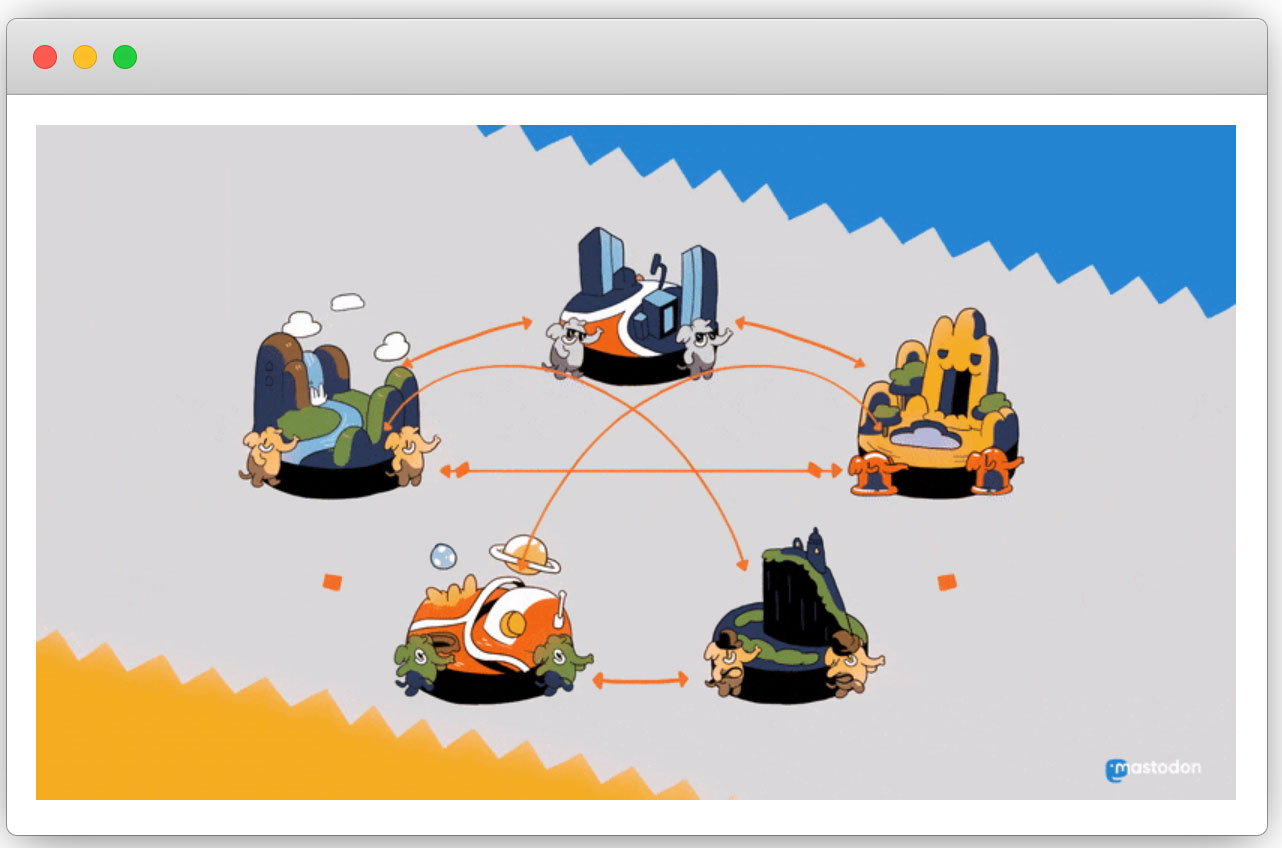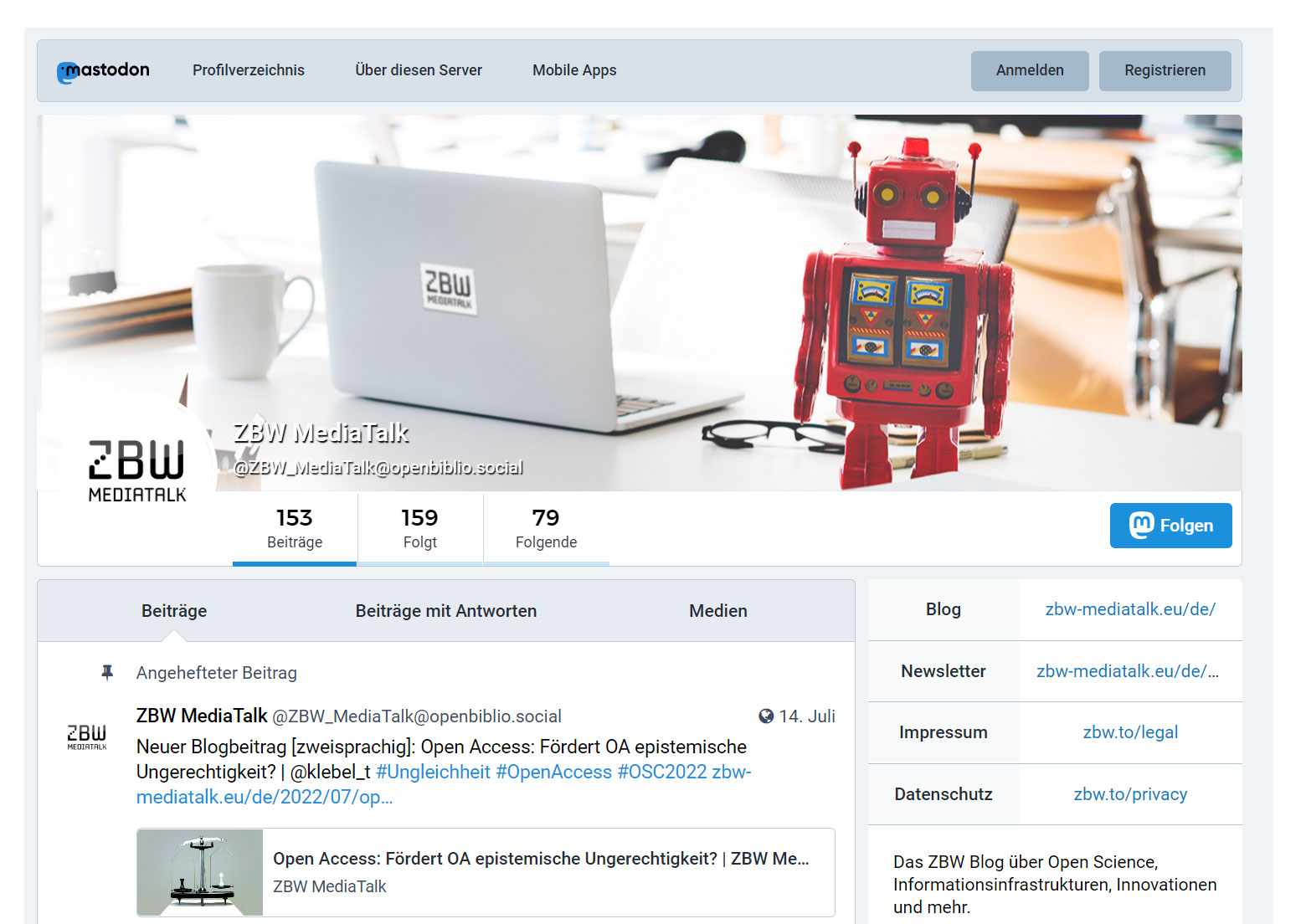
Briefly Noted: ZBW MediaTalk in Test Mode on Mastodon
Even though the purchase of Twitter by Elon Musk is now a case for lawyers, many users from Germany have switched to the social network Mastodon since April 2022 or at least created an account there. ZBW MediaTalk also started a test run. In this article, we share some background information and briefly introduce the platform.
by Claudia Sittner

Profiles of public institutions on commercial social networks have long been a source of unease for data protectionists throughout Germany. But until 2016, there was a lack of equivalent alternatives. Mastodon could be one such alternative. The decentralised network by software developer Eugen Roschko is Open Source with the source code being freely available on Github. The decentralised nature of Mastodon is what makes it so attractive and a good choice from an Open Science perspective.

What is Mastodon? Video by Mastodon on Youtube
Unlike platforms such as Facebook or Twitter, it is non-commercial, free of advertising and run by volunteers, who can also be organisations, on so-called instances. The instances are nodes, i.e. servers, creating a decentralised network: The Fediverse – a cross between “Federated” and “Universe”. The Fediverse is the generic concept for a network of federated systems, which implements a specific protocol (ActivityPub) – like Mastodon.
Data protection and Mastodon
The network is not financed by advertising revenue, which in practice almost always means the collection and use of personal data. So it can be operated in compliance with data protection laws. For data protectionists, however, the decentralisation is the big bonus. It is considered more data-protection compliant because not all data is collected at a central point. Of course, commercial providers can also host an instance, but that would only be one of many. Many Mastodon nodes also have their own data protection statements. However, there are no contracts for Data Processing Agreements. The choice of an instance is, therefore, ultimately a matter of trust.
The increased compatibility with data protection led, among other things, to some German authorities (German) and data protection officers, such as the data protection officer of Baden-Württemberg, Stefan Brink (German), setting up a profile there.
Creating an account on Mastodon: two steps
On Mastodon, users can create accounts in two steps. In the first step, they choose a suitable instance. These differ in terms of the community that has settled there, the usage guidelines, the number of users, the language and the tone. The latter is defined in the usage rules of the instance. Anyone who does not abide by them can be excluded by the admins. Since the individual instances have far fewer accounts than other social networks, expulsion on Mastodon can actually happen quite quickly. It is even possible to exclude entire instances from the Fediverse if, for example, there are no rules of use or the users do not adhere to them and serious cross-account violations occur too frequently.
Finding a suitable instance
There are currently around 3,800 Mastodon instances and 5.2 million users (July 2022). Filter systems or blog posts such as this one (German) can help you find the right instance. When we created the MediaTalk account on Mastodon in 2018 – back then in the tail of the Cambridge Analytica scandal – we chose the OpenBiblio instance. It is run by the Staatsbibliothek zu Berlin (state library). OpenBiblio is constantly growing and currently hosts almost 400 profiles. Around 29,000 contributions have been posted here so far. In the meantime, the instance has become well established for the German-language library scene. In the second step, you can create the user account. The account URL also includes the name of the instance, in our case: https://openbiblio.social/web/@ZBW_MediaTalk.

ZBW-MediaTalk on Mastodon
As can be seen from this example, the name of the instance can already say something about its background, thematic focus and the interests of its community. But don’t worry, choosing an instance is not a life decision: if you don’t feel at home, it is possible to switch. Followers can be taken along, some other things too, but unfortunately not postings.
Posting on Mastodon
To stay with our example: Just because our account is hosted on the OpenBiblio instance does not mean that we can only follow others on that instance and only see their posts, because all instances are linked to the Fediverse. Communication is often compared to e-mail: Even if I have a Googlemail account, I can write mails to users of a Hotmail account and receive mails from them. The practical thing is that with a Mastodon account, you can also follow users with profiles on other Fediverse services like Pixelfed, which is about photos.
So we can follow all other accounts and vice versa. Nothing stands in the way of writing your own posts, which are called “toots” on Mastodon. A toot consists of a maximum of 500 characters. As usual, pictures, videos or similar attachments can be sent along. What is called a “retweet” on Twitter is a “boost” on Mastodon. Instead of hearts or likes, users award stars.
MediaTalk in test mode on Mastodon
After the fuss about Elon Musk’s tweet about buying Twitter, we decided to fill our profile on Mastodon with life. Since we are doing this in test mode for the time being, we are mirroring our tweets there. We currently use the command line tool t2m for this. It’s a bit on the old side, but it’s Open Source and can be easily operated on your own server. There are also online tools for this form of mirroring, but their use in compliance with data protection regulations is questionable. For the reasons mentioned, we are now active on Mastodon, for the time being. But we are confident that we will be there permanently. In what form, after a certain test phase, is still open. So if you are no longer happy on Twitter, maybe because of data protection concerns, you won’t miss anything if you follow us on Mastodon. We would be happy to welcome you there!
This text has been translated from German.
Read more about Mastodon:
- A Twitter Alternative: How Does Mastodon Work?
- What Is Mastodon? Everything You Need To Know About The Social Media Platform
- Quick access to the Mastodon network
- A non-computer-person’s guide to how Mastodon instances work
- A Good Introduction to the Topic: Mastodon: What is it? The Social Network Simply Explained (German)
- Alternative Platforms: How the Move to Mastodon Works out (German)
- What You (as a Twitterer) Should Know About Mastodon (German)
- How do I Find the Right Mastodon Instance for Me? (German)
- Twitter Alternative: More and More Authorities Use Social Network Mastodon (German)
- Interview with Stefan Brink on Authorities in Social Networks: “Mastodon is not a complete, but still a good Twitter replacement” (German).
- Housecleaning on the Social Media: Space for New Things (German)
Read more on MediaTalk:
- Why Libraries Have to be Permanently Active on Social Media: 7 “Glorious” Reasons – 2021 Update
- Scientific Tweets: Why Less is More and When a Tweet is Perceived as Being Scientific
- Study on Twitter Usage: What Roles Do Academic Hierarchies Play?
- Benefit from Twitter as a Learning Tool: Learning in Social Networks
Claudia Sittner studied journalism and languages in Hamburg and London. She was a long time lecturer at the ZBW publication Wirtschaftsdienst – a journal for economic policy, and has been the managing editor of the blog ZBW MediaTalk. She is a freelance travel blogger, speaker and author. She can also be found on LinkedIn, Twitter and Xing.
Portrait: Claudia Sittner©
Featured Image: Mastodon press kit
View Comments

Open Access: Is It Fostering Epistemic Injustice?
A romantic notion of Open Access is that once all knowledge is free, the injustice in...



